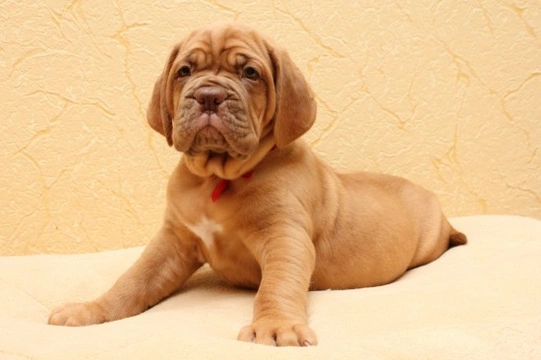
Is a Dogue de Bordeaux the right dog for you?
The Dogue de Bordeaux or French mastiff is a large dog from the mastiff grouping, which is very strong and powerful, and one of the oldest recognised French dog breeds. Due to their size and superior strength, they have a long and varied history within various working roles, including as a watchdog and guard dog for herds of livestock, and also being used to pull carts and carry loads.
The breed’s recorded history goes back to at least the 14th century, and they are most widely known in the Bordeaux region of France, from which they get their name. Their coats are fine, short and soft, and always appear in a shade of red to copper that is very distinctive, and other than white tips to the toes, other markings are considered undesirable.
The Dogue de Bordeaux can stand up to 27” tall at the shoulder, and their weight should be at least 45kg for females, and 52kg for males. As a large, imposing and handsome looking dog, the Dogue de Bordeaux is often one that appeals to people who are looking to buy a larger dog breed, and like the mastiff type’s traits. If you are considering buying a Dogue de Bordeaux, in this article we will look at the temperament and core traits of the breed in more detail, to help you to reach a decision. Read on to learn more.
What is their temperament like?
The Dogue de Bordeaux is a patient, loyal and calm dog that is slow moving and very devoted to its family. Their reputation as a watchdog and guard dog is unmatched, and they can be watchful and potentially suspicious with strangers, but they take their cues from their handlers when it comes to meeting new people. They will naturally see their home and family as part of their range of things to look after and protect, and need no training to do so.
Within the home, they are quiet and not prone to being destructive or over excitable, but in terms of negative traits, almost all dogs of the breed tend to snore quite heavily, and drool prolifically!
How much exercise do they need?
The Dogue de Bordeaux needs regular exercise two or three times per day, which is reasonably long but gentle in pace, rather than involving a lot of high-energy running around. They prefer long walking-pace treks as opposed to racing and galloping, but they can get up to a lolloping canter if the mood takes them! Within the home, they are sedentary and quiet assuming that all of their needs are met and that they do not become bored, but they can become anxious and destructive if they are left alone for long periods of time, or not walked sufficiently.
Are they easy to train?
The Dogue de Bordeaux is a strong willed, independent dog that can be prone to stubbornness, and may become dominant if they are not properly managed. They are not recommended as a good choice for an inexperienced handler, and require clear, firm direction when training, plenty of positive reinforcement, and a reasonable amount of repetition.
Training should begin while the dog is still young, and should be continued throughout the course of the dog’s life. Within the home, they should be provided with clear boundaries, and not permitted to get the upper hand or begin a power struggle over what they can and cannot do!
Are they good with other animals?
The Dogue de Bordeaux should be well socialised with other dogs from an early age, in order to ensure that they will accept the presence of other dogs and play nicely with them. The breed can be prone to dominance with other dogs, and if not well socialised, this can present itself as aggression, but the well socialised Dogue de Bordeaux is usually quiet and tolerant around other dogs, but they will not put up with being harassed!
The breed may be able to live successfully with smaller pets such as cats, providing that they are introduced slowly and positively, and taught to respect the smaller pet. When integration has been achieved, the Dogue de Bordeaux will view the other animal as part of the family, and often, bond strongly with them too.
What type of homes do they need?
The Dogue de Bordeaux needs to have a large enough home that they can move around freely within it, but other than that, they do not require an enormous house. They generally get on very well with children, being calm and gentle around them, and often being very kind and affectionate with kids too. Care should be taken when your child has friends over to visit, to ensure that the dog accepts them too, and does not see them as an intruder.
The Dogue de Bordeaux may not be a good choice for the first time dog owner, but when the balance is right, they are rewarding to own, loyal to their families, and very loving.



